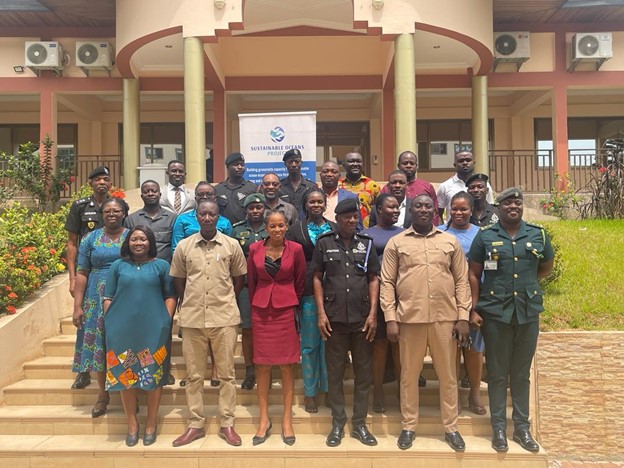The Environmental Justice Foundation (EJF), a non-profit organisation, has organised a workshop for about 30 police officers drawn from the various districts in the Central Region on the ‘Sustainable Ocean Project (SOP)’.
The SOP, a three-year project funded by the Norwegian Agency for Development Cooperation (NORAD), seeks to build grassroots capacity for a sustainable ocean economy in Ghana through inclusive, strong and effective capacity-building, planning and management of coastal ecosystems.
Within the three-year period – between 2022 and 2025 – the Environmental Justice Foundation (EJF), Hen Mpoano (HM) and Central and Western Fishmongers Improvement Association (CEWEFIA) are to work to improve the income of fishing communities and address the effects of climate change on domestic fisheries.
The objective is to facilitate fisherfolks’ access to sustainable fisheries resources, in addition to improving income resilience of fishing communities to climate and resource decline as well as strengthen climate change adaptation capacity in coastal areas.
The SOP is expected to engage small-scale fishers, clam collectors, processors and traders in the value chain across all four coastal regions of Ghana; namely Western, Central, Greater Accra and Volta Regions.
Also, over 5,000 artisanal fisherfolks will be trained in fisheries management issues across the four coastal regions. Over 600 processors will be engaged on value addition, hygienic handling and access to credit.
Again, the project will ensure that women’s voices are influential in decision-making while 1,500 women will directly benefit from training and capacity-building.
In addition, over 30 leaders of Ghana National Canoe Fishermen Council (GNCFC), Ghana Inshore Fishermen Association and GIFA and National Fish Processors and Traders Association (NAFPTA) will be engaged for capacity-building in decision-making. Over 200,000 fishers, including women, along the four coastal regions are expected to be impacted.
Workshop
Topics discussed at the workshop include overview of the NORAD-funded SOP and the fisheries sector, Fisheries Act 625, the role of law enforcement agencies in relation to landing beaches, and emerging issues of child trafficking.
“It’s important to orient the police officers on the Fisheries Act, the relevant section that led to offences and infraction at the beaches and offshore, and how they can collaborate to ensure there is a sustainable fisheries industry,” said Osei- Akoto Nyantakyi, Programme Officer at EJF.
“The ocean is there for our benefit and we must be able to enjoy it today and make it possible for the generations that come after us to also enjoy. The overall objective is to make sure that those at the landing beaches and the police officers who are at the coastal areas collaborate effectively to make sure the right systems are put in place,” he added.
Supt. Isaac Apenteng Mensah, a Prosecutor with the Marine Police Unit at Takoradi Port, explained that there are bye-laws binding fishing activities at the regional and international levels.
“There is the need for collaboration, cooperation and coordination from agencies – such as the Ghana Navy, Police, Immigration and CSOs – to be able to identify fisheries violations and enforce laws,” he said.
He mentioned that laws governing the sea, such as fishing zones, gear closed season, Exclusive Economic Zone (EEZ), among others, must be observed.
He urged individuals interested in the importation and exportation of fish to obtain permits from the Fisheries Commission and the Ministry of Aquaculture.
Netteshiem Kwame Damoah, Central Regional Director of the Fisheries Commission, on his part, noted that research conducted from 1979 to date on fisheries shows that the most commonly consumed fishes are herrings, mackerels and anchovies.
“There are a lot of negative activities going on within some communities, which have culminated in all these. Illegal mining in the forest areas has taken about 25 percent of fishing activities. The water coming from these galamsey sites are polluted and can affect the fishes, since there are traces of mercury in it,” he pointed out.
He, however, alleged that some of these illegal miners are protected by government officials and politicians.










